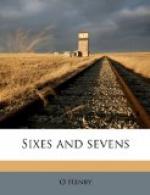The pony with the Dante Alighieri face, guided by the pressure of Sam’s knees, bore that wandering minstrel sixteen miles southeastward. Nature was in her most benignant mood. League after league of delicate, sweet flowerets made fragrant the gently undulating prairie. The east wind tempered the spring warmth; wool-white clouds flying in from the Mexican Gulf hindered the direct rays of the April sun. Sam sang songs as he rode. Under his pony’s bridle he had tucked some sprigs of chaparral to keep away the deer flies. Thus crowned, the long-faced quadruped looked more Dantesque than before, and, judging by his countenance, seemed to think of Beatrice.
Straight as topography permitted, Sam rode to the sheep ranch of old man Ellison. A visit to a sheep ranch seemed to him desirable just then. There had been too many people, too much noise, argument, competition, confusion, at Rancho Altito. He had never conferred upon old man Ellison the favour of sojourning at his ranch; but he knew he would be welcome. The troubadour is his own passport everywhere. The Workers in the castle let down the drawbridge to him, and the Baron sets him at his left hand at table in the banquet hall. There ladies smile upon him and applaud his songs and stories, while the Workers bring boars’ heads and flagons. If the Baron nods once or twice in his carved oaken chair, he does not do it maliciously.
Old man Ellison welcomed the troubadour flatteringly. He had often heard praises of Sam Galloway from other ranchmen who had been complimented by his visits, but had never aspired to such an honour for his own humble barony. I say barony because old man Ellison was the Last of the Barons. Of course, Mr. Bulwer-Lytton lived too early to know him, or he wouldn’t have conferred that sobriquet upon Warwick. In life it is the duty and the function of the Baron to provide work for the Workers and lodging and shelter for the Troubadours.
Old man Ellison was a shrunken old man, with a short, yellow-white beard and a face lined and seamed by past-and-gone smiles. His ranch was a little two-room box house in a grove of hackberry trees in the lonesomest part of the sheep country. His household consisted of a Kiowa Indian man cook, four hounds, a pet sheep, and a half-tamed coyote chained to a fence-post. He owned 3,000 sheep, which he ran on two sections of leased land and many thousands of acres neither leased nor owned. Three or four times a year some one who spoke his language would ride up to his gate and exchange a few bald ideas with him. Those were red-letter days to old man Ellison. Then in what illuminated, embossed, and gorgeously decorated capitals must have been written the day on which a troubadour—a troubadour who, according to the encyclopaedia, should have flourished between the eleventh and the thirteenth centuries—drew rein at the gates of his baronial castle!
Old man Ellison’s smiles came back and filled his wrinkles when he saw Sam. He hurried out of the house in his shuffling, limping way to greet him.




